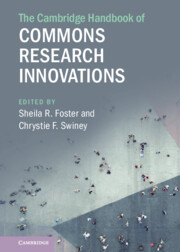Book contents
- The Cambridge Handbook of Commons Research Innovations
- The Cambridge Handbook of Commons Research Innovations
- Copyright page
- Contents
- Figures
- Tables
- Contributors
- Introduction
- Part I Revisiting the Origins and Evolution of Commons Thought
- Part II Averting New Tragedies
- Part III New Forms of Contested Commons
- Part IV Urban Landscape and Infrastructure as a Commons
- Part V Reassessing Old and New Institutions for Collective Action
- Part VI Managing and Restoring the Commons
- Part VII Law, Legal Theory, and the Commons
- 21 Prior Appropriation as a Response to the Tragedy of the Commons
- 22 Using the Public Trust Doctrine to Manage Property on the Moon
- 23 A Biotechnology “Regulatory Commons” Problem
- 24 Can Affirmative Action Offer a Lesson in Fighting Enclosure?
- Part VIII Technology, the Internet, and the Future of Commons Governance
- Index
24 - Can Affirmative Action Offer a Lesson in Fighting Enclosure?
from Part VII - Law, Legal Theory, and the Commons
Published online by Cambridge University Press: 29 October 2021
- The Cambridge Handbook of Commons Research Innovations
- The Cambridge Handbook of Commons Research Innovations
- Copyright page
- Contents
- Figures
- Tables
- Contributors
- Introduction
- Part I Revisiting the Origins and Evolution of Commons Thought
- Part II Averting New Tragedies
- Part III New Forms of Contested Commons
- Part IV Urban Landscape and Infrastructure as a Commons
- Part V Reassessing Old and New Institutions for Collective Action
- Part VI Managing and Restoring the Commons
- Part VII Law, Legal Theory, and the Commons
- 21 Prior Appropriation as a Response to the Tragedy of the Commons
- 22 Using the Public Trust Doctrine to Manage Property on the Moon
- 23 A Biotechnology “Regulatory Commons” Problem
- 24 Can Affirmative Action Offer a Lesson in Fighting Enclosure?
- Part VIII Technology, the Internet, and the Future of Commons Governance
- Index
Summary
This chapter argues that race-based affirmative action in higher education is an intangible commons where the shared resource is diversity, the members are universities and students, and the individuals who seek to end affirmative action are agents of enclosure.The diversity commons provides insight into the conservation vulnerabilities of other commons resources. When affirmative action faces hostile litigation – universities (i.e., the protectors of the diversity commons) focus solely on diversity arguments.Universities’ interests diverge from minority students when they fail to offer equality based defenses (i.e., that admissions are racially discriminatory).While many members of the commons have overlapping interests, a commons is vulnerable to the extent that commons managers have divergent interests from other members. Conservationists must be aware of a party’s interest when considering who should have authority to defend the commons.In the diversity commons, a possible solution is to grant minority students intervenor status so they can advance equality arguments.This solution, if applied abstractly to other commons, would mean introducing gridlock as a conservation tool.One manifestation of gridlock could be to give all commons members with use rights the power to defend against development and enclosure.
Keywords
- Type
- Chapter
- Information
- The Cambridge Handbook of Commons Research Innovations , pp. 284 - 292Publisher: Cambridge University PressPrint publication year: 2021



